Download - Downbeat
Download - Downbeat
Download - Downbeat
- TAGS
- download
- downbeat
- downbeat.com
You also want an ePaper? Increase the reach of your titles
YUMPU automatically turns print PDFs into web optimized ePapers that Google loves.
apartment is even more apparent now. Scott’s<br />
appreciation for the ability of music to tell stories<br />
and to make social commentary is rare, and<br />
the way in which he follows through on those<br />
ideas is unique.<br />
Scott’s company, like his music, has a comfortable<br />
intensity to it—an easy warmth that<br />
wins you over even when he’s on a mission to<br />
change your mind about something.<br />
Though gracious and polite, Scott presents<br />
his point of view with the same confident<br />
authority he puts into his live shows. And even<br />
when what he says rubs folks the wrong way,<br />
30 DOWNBEAT April 2010<br />
his honest expression comes with a grain of<br />
erudite salt.<br />
Take his position that the neo-classicist<br />
movement has such an overbearing presence in<br />
jazz education and contemporary music that<br />
young players are discouraged from trying to<br />
move past it. Yes, that means he thinks it’s time<br />
to find a new, post-Wynton Marsalis era.<br />
But his new album is at its core a contemporary<br />
riff on bebop and post-bop. And so was<br />
Marsalis’ self-titled 1981 release.<br />
“He’s very diligent in trying to learn and do<br />
new things,” said McCoy Tyner, who featured<br />
Scott as a special guest on the road in 2008.<br />
“He’s considerate of the tradition of the music<br />
and what happened before and moving ahead to<br />
what’s happening in the future.”<br />
Tyner’s right. The second track on Yesterday<br />
You Said Tomorrow is a cover of Radiohead’s<br />
“The Eraser,” but its washed production—courtesy<br />
of Rudy van Gelder—gives it a sepia-toned<br />
sound that matches the gritty quality of the otherwise<br />
all-original album.<br />
“I know he’s made some comments about<br />
certain things,” Tyner says. “He’s opinionated,<br />
but he has a right to have his own opinion. I give<br />
him credit for that. It’s reflected in his playing.”<br />
Tyner and Scott met in 2006, when the<br />
young trumpeter was tapped for Tyner’s The<br />
Story Of Impulse. Tyner heard something in<br />
Scott’s sound that reminded him of “what cats<br />
were doing in the ’60s,” as Scott tells it.<br />
Scott began bouncing ideas off Tyner, while<br />
Tyner shared with him new ways of thinking<br />
about harmonics. Scott was already preparing to<br />
record the material on Yesterday You Said<br />
Tomorrow back then, and knew he wanted an<br />
analog aesthetic—in Scott’s words, “visceral,<br />
dirty type of recording”—that would meld harmonic<br />
tension with some of the post-rock concepts<br />
that appeared on his 2007 release Anthem.<br />
The time he spent with the pianist seemed to<br />
turn on a few lightbulbs on his creative path to<br />
the new release.<br />
“I like that spirit he has, his dedication to<br />
music; he’s really in love with what he’s doing,”<br />
Tyner says. “He knows the traditions that exist<br />
in this music.”<br />
Indeed, Scott came up steeped in a world<br />
of musical traditions. After his mother,<br />
Cara Harrison, heard her grade schoolaged<br />
son correctly identify the sound of a coin<br />
dropping to the floor of their New Orleans<br />
home as “F-sharp,” she says she knew he was<br />
bound for a future in music, like so many others<br />
in her family.<br />
It wasn’t long before most of Scott’s mornings<br />
started out with a wake-up call from his<br />
grandfather, Big Chief Donald Harrison Sr.,<br />
directing him to report to the kitchen table<br />
with his trumpet to perform “Bag’s Groove”<br />
and other tunes. If he missed a note, his grandfather,<br />
a folk singer and an important cultural<br />
force in the Mardi Gras Indian community,<br />
would sing the bar to Scott, who would play it<br />
back until he got it right. The next morning,<br />
the ritual would repeat.<br />
The name Harrison is one of music royalty in<br />
New Orleans. Scott’s mother has been a singer<br />
all her life. His maternal grandmother played<br />
piano and clarinet. His uncle is the acclaimed<br />
saxophonist Donald Harrison Jr. And his aunt<br />
Cherice Harrison-Nelson runs the Mardi Gras<br />
Indian Hall of Fame, a cultural center devoted to<br />
one of the most unique and influential elements<br />
of the city’s heritage.<br />
Soon after he got his start in music, Scott<br />
began gigging regularly with Donald Harrison

















